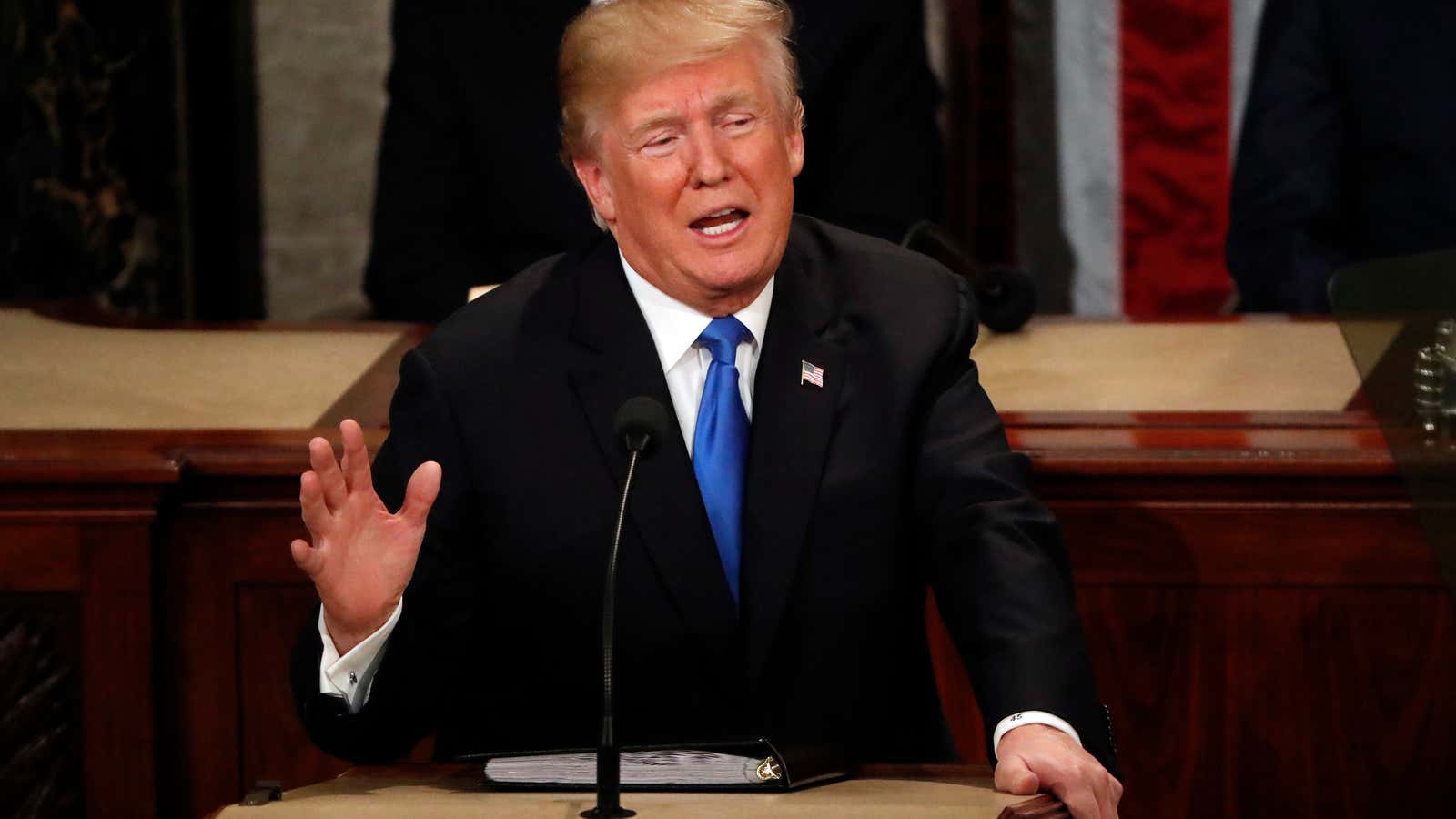Donald Trump’s State of the Union speech was supposed to focus unifying America, but it instead highlighted many of the biggest gaps and cultural battlegrounds of his first year in office.
In a speech that lasted over an hour, the president made several appeals for unity, including “I call upon all of us to set aside our differences, to seek out common ground, and to summon the unity we need to deliver for the people,” and “We all share the same home, the same heart, the same destiny, and the same great American flag.”
But in the House chamber where Trump spoke, a rift in his audience was palpable. Congressional Republicans to Trump’s left were overwhelmingly male and white. Dressed in dark suits and bright ties, they leapt to their feet as Trump’s speech hit party talking points, cheering when Trump said, for example, “We repealed the core of the disastrous Obamacare—the individual mandate is now gone. Thank heavens.”
To Trump’s right, Democrats staged a protest. Most of its female members and the Congressional Black Caucus were seated prominently, wearing all black with pins and scarves representing the #MeToo protest and solidarity with African nations, which Trump allegedly slurred as “shitholes.” They neither stood, nor applauded.
As in other speeches, Trump boasted of stock market gains and the tax reform bill that has slashed the corporate tax rate. He also made new promises of the administration’s goals for the coming year, including auto plants that will be “opening all over the country,” a promise to “reduce the price of prescription drugs,” and a plea for Congress to write a $1.5 trillion infrastructure bill based around public-private partnerships.
In our drive to make Washington accountable, we have eliminated more regulations in our first year than any administration in history.
We have ended the war on American Energy — and we have ended the war on clean coal. We are now an exporter of energy to the world.
In Detroit, I halted Government mandates that crippled America’s autoworkers — so we can get the Motor City revving its engines once again.
(…)
To speed access to breakthrough cures and affordable generic drugs, last year the FDA approved more new and generic drugs and medical devices than ever before in our history.
Trump’s State of the Union speech was written by Stephen Miller, the anti-immigration advisor driving the White House’s extreme negotiating stance on DACA. It repeated some of Trump’s most divisive, and sometimes factually incorrect, rhetoric on immigration and Mexicans.
He earned hisses from the Democratic side of the room with comments on immigration, including his claim that “open borders have allowed drugs and gangs to pour into our most vulnerable communities,” and that a “single immigrant can bring in virtually unlimited numbers of distant relatives.” In a dig at the children of undocumented immigrants who have grown up in the United States, known as Dreamers, Trump noted, “Americans can be Dreamers too.”
Trump also caused alarm among some in the audience by criticizing citizens who don’t stand for the national anthem; calling for Congress to allow him to remove federal employees who “undermine the public trust,”; and pledging to leave open the controversial Guantanamo Bay detention facility.
In the past, we have foolishly released hundreds of dangerous terrorists, only to meet them again on the battlefield — including the ISIS leader, al-Baghdadi.
So today, I am keeping another promise. I just signed an order directing Secretary Mattis to reexamine our military detention policy and to keep open the detention facilities at Guantánamo Bay.
Trump mentioned only briefly the opioid crisis, a problem his administration has been criticized for failing to address.
In 2016, we lost 64,000 Americans to drug overdoses: 174 deaths per day. Seven per hour. We must get much tougher on drug dealers and pushers if we are going to succeed in stopping this scourge.
My Administration is committed to fighting the drug epidemic and helping get treatment for those in need. The struggle will be long and difficult — but, as Americans always do, we will prevail.
There was no moment more telling of the American divide than the end, when Trump talked of the “yearning for freedom that nearly 250 years ago gave birth to a special place called America,” and the original colonists who “could rule themselves.” Republicans sprang to their feet, clapping and chanting “USA, USA,” while the Democratic side looked pained.
Republicans stood and cheered again as Trump closed the speech with a promise that American “families will thrive” and “people will prosper” as long as citizens are “proud of who we are,” while many Democrats silently walked out.
Before Trump’s speech, the US government was already at loggerheads on issues like immigration and Russian election meddling—a topic which did not make it into the prepared remarks at all. Trump and his allies in Congress, including speaker of the House Paul Ryan, have been agitating for a “cleanse” of the Federal Bureau of Investigation, which is probing Russian meddling in the 2016 election. Already, Trump has fired an FBI director, deputy director, and acting attorney general. Meanwhile, Democrats and some Republicans would like to see the probe completed, and are concerned that Russia will meddle in the upcoming midterm elections.
Trump’s presidency has been marked by an uptick in racial and cultural tensions in the country. He publicly mocked politicians, NFL players, celebrities and civil servants, and appeared to single out black women particularly for criticism. A Pew Research poll this past fall found 60% of Americans believe that Trump’s election has led to worse race relations in the country.
